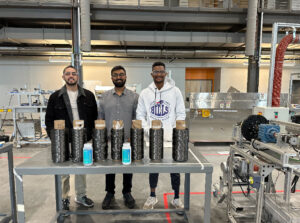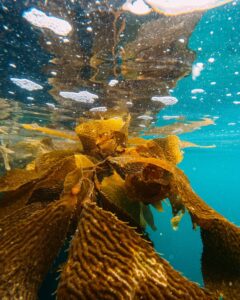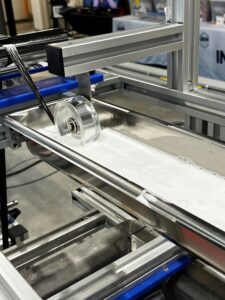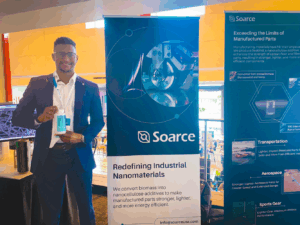
Soarce co-founders Derek Saltzman (right) and Mason Mincey (left) with Umesh Marathe of University of Tennessee – Oak Ridge Innovation Institute.
ORLANDO — Soarce is turning seaweed into a high-performance composite material that could reshape industries from defense to electric vehicles.
Founded in 2021 by materials scientists Derek Saltzman and Mason Mincey, both alumni of the University of Central Florida, Soarce has developed a proprietary process to extract nanocellulose from brown seaweed, producing a material stronger than steel yet lightweight and biodegradable.
Their innovation addresses a shortcoming in current materials used in a variety of high-tech products. The company is a member of Cenfluence’s Energy + Environmental Sciences cluster.
“We realized premium nanomaterials like graphene are difficult to produce, prohibitively expensive, and put worker safety at risk,” said Mincey, who co-founded the company in 2021, the same year he graduated from UCF with a bachelor’s degree in materials engineering. “We then came across a material called nanocellulose that you can extract from any biomass on the planet. It also had strength properties eight times stronger than steel but was ultra-light.”
Why seaweed? Brown seaweed is a low-lignin — a complex polymer that makes up plant cell walls — and it’s a sustainable and abundant resource, which reduces the energy and chemical resources needed to extract cellulose. By utilizing its cellulose pulp that’s often considered waste, Soarce aims to create a product for industrial use with minimal environmental impact.

By using cellulose pulp that’s often considered waste, Soarce creates biodegradable solutions with minimal environmental impact. (file photo)
Saltzman and Mincey met as UCF students and went on to collaborate on research involving advanced nanomaterials. In 2021, the two won UCF’s Joust New Venture Competition (the university’s version of television’s Shark Tank) when they used the material they’d created for active wear. Saltzman now serves as Soarce’s CEO while Mincey holds the position of chief operating officer.

The Soarce team learned that nanomaterials derived from nature can be stronger than synthetic materials made from finite resource. (Photo: Soarce)
The company’s RokaCell™ process uses natural solvents derived from fruits and vegetables to extract and functionalize cellulose from seaweed, creating Seabind™, a nanocellulose additive compatible with standard manufacturing equipment. Soarce is based at the GuideWell Innovation Center in Orlando.
Soarce recently demonstrated its material’s scalability by processing it using industrial fiber coating technology in a 20,000-square-foot facility, in partnership with Oak Ridge National Laboratory and the University of Tennessee.
“This was a recent pivotal milestone to convert some of the largest players in the composite industry to have conviction that our product can work at scale,” Mincey said.
The startup has secured a Phase I Small Business Innovation Research (SBIR) grant from the National Science Foundation and was a finalist in the Ocean Exchange challenge. Soarce has been selected to participate in several innovation and entrepreneurial support programs, including the Venture Well Ocean Enterprise Accelerator and Biomimicry Institute Ray of Hope Accelerator.
Working with Cenfluence and the Florida High Tech Corridor, Soarce was assisted in reviewing grant proposals and navigating government contracts. The company credits its involvement with Cenfluence and The Corridor for helping it attend a defense industry conference where Saltzman and Mincey identified a “pain point” in composite materials for the sector, helping the company focus on a growth area for the business.

Mason Mincey representing Soarce at the Synapse Summit in Tampa in March. (Photo: Mariana Camargo, Cenfluence)
Looking ahead, Soarce plans to launch its first one-ton facility to serve customers in the defense, aerospace, and sports equipment industries, and has targeted the electric vehicle manufacturing industry as the next user of its materials to extend the range of electric vehicles.
“In the next few years, we aim to be a pivotal industrial partner in America’s mission to localize advanced manufacturing and help build back our defense and industrial complex,” Mincey said.
For more information, visit Soarce’s website. To learn more about Cenfluence’s Energy + Environmental Sciences Cluster contact Cluster Manager Lisa Rain.
